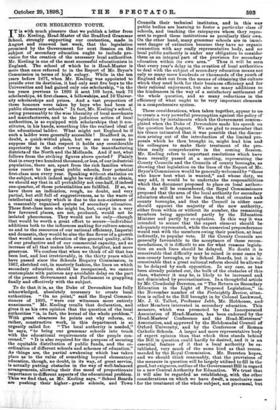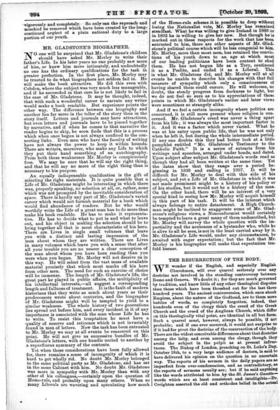OUR NEGLECTED YOUTH.
IT is with much pleasure that we publish a letter from Mr. Keeling, Head-Master of the Bradford Grammar School, strongly supporting our contention, made in August and renewed last week, that the legislation promised by the Government for next Session on the subject of secondary education ought to include pro- vision for the creation of the necessary local authorities. Mr. Keeling is one of the most successful educationists in England. The school of which he is Head-Master is more than once referred to in the Report of Mr. Bryce's Commission in terms of high eulogy. While in the ten years before 1871, when Mr. Keeling was appointed to preside over its destinies, it had only sent five boys to the Universities and had gained only one scholarship, " in the ten years previous to 1893 it sent 108 boys, took 73 scholarships, 44 first classes, 4 fellowships, and 10 Univer- sity scholarships and prizes. And a vast proportion of these honours were taken by boys who had been at public elementary schools." In fact, Mr. Keeling's school, owing presumably to the wise liberality of local merchants and manufacturers, and to the judicious action of local authorities, is so equipped with scholarships that it con- stitutes, in his hands, something like the realised ideal of the educational ladder. What might not England be if such a ladder were generally accessible ! Bradford is, no doubt, a quick-witted place, but we see no reason to suppose that in that respect it holds any considerable superiority to the other towns in the manufacturing districts of the North and the Midlands. And if not, what follows from the striking figures above quoted ? Plainly that in every two hundred thousand, or less, of our industrial population, there are, apart from the rich families whose sons resort to the great public schools, four potential first-class men every year. Speaking without statistics on the subject, which indeed might be very difficult to obtain, we should say that in all probability not one-half, if indeed one-quarter, of those potentialities are fulfilled. If so, we have there an indication, rough, no doubt, and very partial, but still full of suggestiveness, as to the waste of intellectual capacity which is due to the non-existence of a reasonably organised system of secondary education. These first-class men who might be, but, except in a very few favoured places, are not, produced, would not be isolated phenomena. They would not be only—though that would be worth a great effort to secure—individual additions both to the influences making for culture among us and to the resources of our national efficiency, Imperial and domestic, they would be also the fine flower of a growth that would mean an elevation of the general quality, alike of our productive and of our commercial capacity, and an increase of all that makes life sweeter, brighter, and more generous. We confess that when we think of all that has been lost, and lost irretrievably, in the thirty years which have passed since the Schools Enquiry Commission, in 1867, sketched out, in masterly fashion, the lines on which secondary education should be reorganised, we cannot contemplate with patience any avoidable delay on the part of the present Government and Parliament in grappling finally and effectively with the subject.
To do that it is, as the Duke of Devonshire has fully acknowledged, absolutely necessary to create local authorities. " On no point," said the Royal Commis- sioners of 1895, " were our witnesses more entirely unanimous." Mr. Keeling recalls that declaration, and gives it as his own opinion that the question of the local authorities " is, in fact, the kernel of the whole problem." With great clearness he points out why reform, or, rather, constructive work, in this department is so urgently called for. " The local authority is needed," he says, "to bring our grammar schools into touch with the educational requirements of the people con- cerned." " It is also required for the purpose of securing the equitable distribution of public funds, and the co- ordination of different schools and schemes of education." As things are, the partial awakening which has taken place as to the value of something beyond elementary education, though, no doubt, in its way, of great service, is actually putting obstacles in the way of well-balanced arrangements, allowing their due meed of proportionate importance to different aspects of the educational problem. Thus we find that, as Mr. Keeling says, " School Boards are pushing their higher - grade schools, and Town Councils their technical institutes, and in this way public bodies are learning to foster a particular class of schools, and teaching the ratepayers whom they repre- sent to regard these institutions as peculiarly their own. On the other hand, many grammar schools are in immi- nent danger of extinction because they have no organic connection with any really representative body, and no local public authority is under any obligation to consider them as an integral part of the provision for secondary education within its own area." Thus it will be seen that every year's delay in the creation of local authorities to deal with the subject of secondary education means net only so many more hundreds or thousands of the youth of England shut out from the means of obtaining the culture which they need both for their business efficiency and for their rational enjoyment, but also so many additions to the hindrances in the way of a satisfactory settlement of the whole question, and so many reductions in the efficiency of what ought to be very important elements in a comprehensive system.
These considerations, when taken together, appear to us. to create a very powerful presumption against the policy of legislation by instalments which the Government contem- plated when the Duke of Devonshire made his speech on the question last August. We are glad to remember that his Grace intimated that it was possible that the discus- sion arising out of the introduction of the limited pro- posals which he then brought in, might lead him and his colleagues to make their treatment of the pro- blem really comprehensive in the coming Session. Mr. Keeling refers to important resolutions which have been recently passed at a meeting, representing the County Councils and the Councils of county boroughs, as showing that legislation on the lines of the Report of Mr.. Bryce's Commission would be generally welcomed by "those who know best what is wanted," and whose duty, we may add, it would be to undertake the responsibilities- which that document proposed to place on local authori- ties. As will be remembered, the Royal Commissioners proposed that the area of the local authority for secondary education should not be less than that of counties and county boroughs, and that the Council in either case- should appoint the majority of the new authority,.. either from within or without its number, the remaining members being appointed partly by the Education Minister and partly by co-optation. In this way it was intended to secure that the expert element should be- adequately represented, while the numerical preponderance would rest with the members owing their position, at least indirectly, to popular vote. If the County Councils are generally favourable to the acceptance of these recom- mendations, it is difficult to see for what reasons legisla. tion on such lines should be delayed. No doubt it is conceivable that difficulty may be raised in some cases by non-county boroughs, or by School Boards, but it is in- conceivable that a great national reform should be allowed. to be delayed by such opposition. In any case, as has been already pointed out, the bulk of the obstacles of this class, whatever it may be, is likely to be increased and not diminished by procrastination. In a thoughtful article by Mr. Cloudesley Brereton, on " The Return on Secondary Education in the Light of Proposed Legislation," in- the November number of the Fortnightly Review, atten- tion is called to the Bill brought in by Colonel Lockwood, Mr. J. G. Talbot, Professor Jebb, Mr. Hobhouse, an& other Members interested in secondary education. This measure, which was promoted by the Incorporated Association of Head-Masters, has been endorsed by the- Head-Masters' Conference and the Head-Mistresses' Association, and approved by the Hebdomadal Council of Oxford University, and by the Conference of Roman. Catholic Schools. A larger and more representative body of expert opinion than that which thus stands behind the Bill in question could hardly be desired, and it is an essential feature of it that a local authority be es- tablished, very much of the same kind as that recom- mended by the Royal Commission. Mr. Brereton hopes, and we should think reasonably, that the provisions of the measure in question will be largely utilised to fill in the good, but exiguous, outline of the Government Bill in regard to a new Central Authority for Education. We trust that it will also be regarded as establishing, with the other considerations on which we have dwelt, a conclusive case for the treatment of the whole subject, not piecemeal, but vigorously and completely. So only can the reproach and mischief be removed which have been created by the long- continued neglect of a plain national duty to a large portion of our youth.







































 Previous page
Previous page